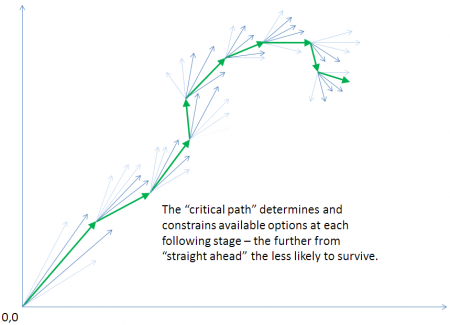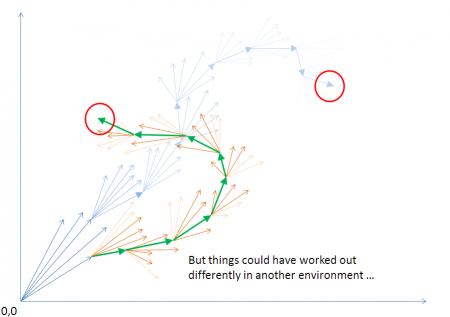Path-dependent
|
The JC’S favourite Big Ideas™
 
|
Path-dependent
/pɑːθ-dɪˈpɛndənt/ (adj.)
Of a circumstance, that its coming about can only be explained by the sequence of events and contributing factors that lead to it; that it cannot be justified or explained by reference only to existing conditions.
The way things turned out depended on the coincidental interaction and juxtaposition of unrelated factors in the ecosystem.
The classic case is of course evolution by natural selection: re run the tape from the beginning and you would not get the same result.
Backtesting
Backtesting is the industry of try to solve for the future by reference to the past. We observe 5 years of market data and conclude that a certain trading strategy, x, would represent optimal performance in that historical environment. Notwithstanding that had trading strategy x have been adopted in that environment, the outcome of that environment would have been different. Historical timeline is fixed and not contingent. Decisions we make now can no longer affect it. The future timeline is contingent and depends on decisions we make
Causal determinism
Amazon butterflies: confusion about the power of iteration lies behind our obsession with butterflies in the Amazon setting off hurricanes in the Philippines.
We accept causal determinism because the alternative seems inconsistent with the regularities we apprehend. But still, even in the past the lattice of potential causal chains is far more complex than we can dream of — our data is necessarily incomplete — so even historical causal chains we construct are works of imaginative fiction. (This is why historians do not agree).
But looking at a unitary historical causal chain (that we made up), in hindsight we miss the contingency from which it was created. Once it is laid down it looks inevitable. It looks to be set in stone. It looks to have been pre-ordered a full stop This is a curiously religious idea.
In any case, if we accept the proposition that there is but one past (whether or not we can never be sure what it is) there remain, from any given present, an infinity of futures.
The temptation of looking at our concrete past, is to see a single decision, at any point on that timeline as having determined the remaining history to the present. The extrapolation is that it will determine future also, unless a counterweighting single decision of equal significance can be made.
But neither is true. We have, and our ancestors had, the ongoing ability to change things daily by the decisions they, and we, made. Everyone makes bad decisions. The key is not to be defined by them . To make more good decisions than you do bad ones.
You can't undo the decisions of the past, whether made by you or about you, or by your ancestors or about them.
So, serenity’s prayer: have the courage to fix the things you can do, being those in the present live.com and up for debate; and the patience 2 2 to bear those things you cannot, and the wisdom to know the difference.
You cannot influence all matters and present Colleen some wisdom is required. That little wisdom is needed to know you cannot change the past.
The best you can do is change the stories you tell yourself,and others, about it.
Pragmatist’s prayer and the infinite game
Finite and infinite games is, as ever, handy metaphor for framing these battles of the past and present. For what is a “lived experience”, a “grievance” or a “standpoint”, if not an articulations of history? The future contains unlived experiences. There are no grievances. Our standpoints, the margins and their intersections are unknown.
Being historical, a lived experience is permanent, and set it stone. It cannot be moved. It cannot be removed. It cannot be compensated for. It cannot be denied. It becomes a monument. A shibboleth. A sacred prophecy. But it is our imaginative construction. We choose our significant events. We build our own memorials. We choose to live beneath their shadows. But our present is a function of every point in the past, not just the ones it's suits us to settle on.
This is the empathetic stance. To adopt a historical narrative: to step into its shoes, to take sides, to exalt it and perpetuate its grievance.
But, look: standpoints iterate. As the present moves through spacetime, we lay down the tracks of future, each new decision we make contributes to our lived experience. We update our standpoints. The decisions of the past for all further away in time and significance. It is an inverse square.
The infinite game counsels us to look at where we are, see what we’ve got and make the best of it. It focuses on the decisions of the now and the possibilities of the future. It regards the past as informational and instructive, not constraining. If I once hit my thumb with a hammer, I know to be careful next time I have a hammer. It does not make me forever a victim of hammer abuse.
The past as a formal system
Not also the idea that the past is a single formal causal chain, that we know about, is is a classic example of legibility in the sense articulated by James c Scott in seeing like a state. Articulation of history is necessarily a simplification, and model, a boiling down of an infinity of information into a single digestible narrative. It necessarily Mrs please in the same way that informal systems and interactions are are critical to the operation of a state or a business so are informal, unobserved, and noticed interactions.
Not only is “the past” —as we articulate it — inert and immutable, it's not even true. We can adjust it and do adjusted by nearly changing our account of it. This is the orwellian concept Colin Wright and rewrite and erase our history whilst insisting on its utter continuity. The true history of the universe is immutable. The stories we tell ourselves about it are not.